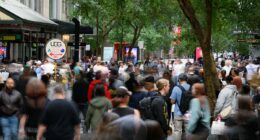Share this @internewscast.com

The findings suggest that interventions promoting educational attainment could slow biological aging and enhance longevity.
The National Institute of Mental Health (NAMH) estimates that 31% of U.S. adults may experience an anxiety disorder at some point in their lives. If left unaddressed, anxiety can exacerbate symptoms and adversely affect relationships and work performance. To combat anxiety, individuals can adopt self-soothing techniques. These strategies aim to alleviate stress and promote emotional well-being. From the worry jar exercise to positive affirmations and breathing techniques, various methods can help manage anxiety effectively. By incorporating these practices into daily routines, individuals can cultivate resilience and better cope with stressors. Ultimately, prioritizing mental health and adopting self-soothing techniques can lead to improved overall well-being and a greater sense of calmness in daily life. The study, conducted by Columbia University Mailman School of Public Health and The Robert N. Butler Columbia Aging Center, analyzed data from the ongoing Framingham Heart Study, spanning three generations. The researchers aimed to explore the connection between educational mobility and aging.
The Role Of Education In Longevity
Participants who achieved higher levels of education experienced slower biological aging and lived longer lives compared to those with lower educational attainment. This association between upward educational mobility and a slower pace of aging was significant, highlighting the impact of education on longevity.
Measuring Pace Of Aging
The researchers utilized the DunedinPACE epigenetic clock, a tool that measures the pace of aging based on DNA methylation marks in white blood cells. Two years of additional schooling were associated with a two- to three-percent slower pace of aging, correlating with a ten-percent reduction in mortality risk.
Biological Aging And Epigenetic Clocks
Biological aging refers to molecular changes that affect cellular integrity and resilience over time. The DunedinPACE epigenetic clock functions as a speedometer for the aging process, measuring how fast or slow a person’s body is aging based on DNA methylation.
Study Design And Findings
Data from 14,106 participants were analyzed to link educational attainment with biological aging. The study focused on educational mobility relative to parent and sibling differences in educational attainment to control for familial factors. Results showed that upward educational mobility was associated with a slower pace of aging and reduced risk of death, explaining up to half of the educational gradient in mortality.
Implications And Future Research
The findings suggest that interventions promoting educational attainment could slow biological aging and enhance longevity. However, further experimental studies are needed to confirm these associations. Epigenetic clocks like DunedinPACE provide a valuable outcome measure for assessing the impact of education on healthy aging, offering insights into preventive strategies before the onset of age-related diseases.













